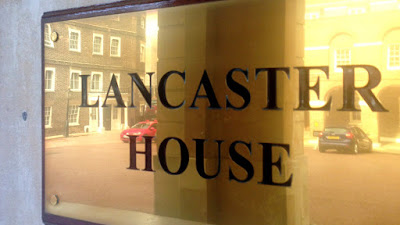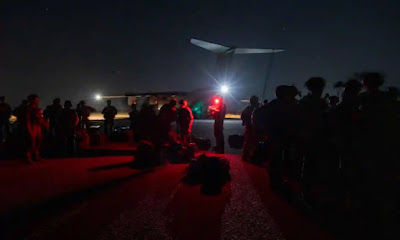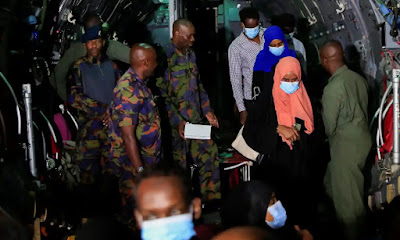 |
| Presidential Palace Khartoum 2012 by the author |
Sudan - can the UK's "progressive realism" help?
Former Ambassador
April 11, 2025
The world’s worst humanitarian crisis and one of its most dangerous, complex, bloody wars gets a moment in the spotlight in London on 15 April. Foreign ministers and senior officials from international organisations will meet at Lancaster House to discuss Sudan. After two years of conflict, the UK is taking a diplomatic initiative that many believe long overdue given its historical ties and current responsibility at the United Nations Security Council to hold the pen on Sudan resolutions.
But is the conference likely to lead to anything positive for the Sudanese people?
Expectations are understandably low. The de facto Sudanese authorities led by the Sudanese Armed Forces (SAF) have criticised the UK for not inviting them to the conference. They object strongly to the UAE being invited because they consider it an ally of the rival Rapid Support Forces (RSF) and therefore a party to the conflict. On the ground both the RSF and Sudanese Armed Forces (SAF) have pledged to continue the war until they achieve complete victory. No impartial observer thinks that possible. As the war drags on, Sudan suffers from political polarisation, fragmentation and continued external meddling.
It's too easy to look the other way and too easy to think this is just a messy, protracted struggle that will continue inconclusively. But the immediate future may not be a continuation of the last two years.
Red warning lights are flashing. Sudan’s neighbour South Sudan is teetering on the brink of civil war and the Sudanese conflict is playing its part in destabilising South Sudan and vice versa. Other neighbouring countries are also vulnerable to fall-out from Sudan: Chad in particular. With any expansion of war in the region, the humanitarian consequences and political risks of spiralling conflict magnify. Within Sudan itself the increased presence of Islamist extremists, armed militia and potentially international terror groups is another flashing light. Geopolitical tensions - already existing - may escalate. The Sudan Armed Forces have been ostracised by western powers and have entered agreements with Russia and Iran in their search for arms. Both countries see establishing a presence on Sudan’s Red Sea coast as a prize. But such a move would be highly provocative for others, including Israel, Saudi Arabia and the UAE.
Over the last two years efforts to broker ceasefires have failed, only limited progress has been made on improving humanitarian access and efforts to bring about a comprehensive political settlement between the various actors - the two military forces, political parties, armed movements and civil society actors - have all led to nought. Many have tried, including the UN, AU, IGAD, the US, Saudi Arabia, Egypt and Turkey but none has succeeded. These “track 1” efforts have been complemented by multiple “track 2” initiatives led by NGOs and peace foundations. But so far the willingness to give as well as take in any negotiation is sorely missing.
Proposals
Absent political will by the protagonists and their external backers, what can be achieved in London?
Limited but important steps can be agreed in three areas: the humanitarian response, political process and international cooperation.
On the humanitarian front, the key challenges remain both funding and access. In April 2024 at a conference in Paris, donors made generous pledges totalling USD $2 billion. Much of that has yet to be disbursed. London is not a pledging conference, but should be the opportunity for partners to live up to their past commitments and renew their determination to provide life-saving humanitarian assistance for the 11 million Sudanese forced to flee their homes— food, shelter, medicines and healthcare at a minimum. The challenges for humanitarians are enormous: Sudan’s domestic political and ethnic complexity compounded by the regional tensions with and between Sudan’s neighbours necessitate an enhanced international aid effort coordinated by a senior UN figure.
A political process remains the missing element and in London agreement may be possible on how to deal with the most immediate challenge as well as on the essential elements for a future process. Since the SAF now control the capital Khartoum again, it is likely they will press ahead with their own political roadmap and appoint a civilian government subordinate to the military to take forward a transition towards eventual restoration of democracy.
How should the international community respond to this - reject, ignore, embrace, or shape it? Given the risk of Sudan being partitioned into two warring regions - Darfur and the South controlled by the RSF and the North, East and centre being controlled by the SAF - no SAF-imposed roadmap is going to be the final word. Not only will it not include the RSF and its supporters, but also many of the political actors who supported the 2019 revolution, which overthrew General Bashir’s military rule, will have nothing to do with the SAF roadmap. So the challenge for the international community is to try to work within the new political reality on a temporary and tentative basis. The aim should be to shape the SAF’s actions in order to move towards a credible inclusive political transition. The London conference could agree criteria by which such a political process will be judged. Key questions will be: how inclusive is the process and what genuine efforts are made to ensure inclusiveness of all Sudan; how are civil and political rights protected; how will security, justice and reconciliation be achieved; what are the criteria for selection of members of a transitional administration; what real authority will the administration have over economic and budgetary affairs; what are the provisions and realistic timetable for an all-inclusive Sudanese national dialogue? Above all, how firmly enshrined is the commitment to full democratic and civilian rule in Sudan, for which Sudanese men, women and youth struggled and died over the years?
These are difficult questions that have defied easy answers since 2019. Helping Sudanese actors address them will require substantial and coordinated international action.
The third way the London conference could contribute is by setting out agreed principles and a framework for the international community. The Sudan crisis is of such a complexity and international nature that it requires a creative and collaborative approach. The conference could propose that an international panel of mediators be appointed, led by the African Union but comprising additional senior figures from beyond Africa. Rank is important and ideally the panel would be at former head of state or government level and mandated by a UN Security Council resolution. The panel’s focus should be on advancing a comprehensive political settlement. Early consultation with the SAF, RSF and Sudanese civil and political actors about the terms of reference will be essential. The conference could agree who should take forward this consultation and a time frame.
Conclusion
Foreign Secretary David Lammy convened the conference after seeing at first hand the devastating impact of the war on Sudanese women and children on the Chad-Sudan border. Just because the Sudan war is complicated and far from our TV screens, we cannot in all conscience ignore it. This is a moment to put the Foreign Secretary’s doctrine of “progressive realism” into action.
[These are the personal views of the author and do not represent the views of any organisation with which he is associated.]
CMI — Martti Ahtisaari Peace Foundation
View original: https://www.linkedin.com/pulse/sudan-can-uks-progressive-realism-help-sir-nick-kay-nc3be/
___________________________
Related
Sudan Watch - 19 Nov 2010
British Ambassador in Khartoum Nicholas Kay is blogging the drama and scale of the change taking place in Sudan
The British government's Foreign & Commonwealth Office, commonly called the Foreign Office or the FCO, has started a blog about the work of the British Ambassador to Sudan. The blog is authored by Nicholas Kay CMG, Her Majesty's Ambassador to Sudan. Mr Kay (pictured below) arrived in Khartoum to take up his role as HM Ambassador to Sudan on 29 May 2010. Here is a copy of his first two blog posts followed by several related reports.
Full story: https://sudanwatch.blogspot.com/2010/11/british-ambassador-in-khartoum-nicholas.html
_____________
Sir Nicholas Kay KCMG
British Ambassador to the Republic of Sudan 2010 to 2012
https://www.gov.uk/government/people/nicholas-kay
_____________
End





